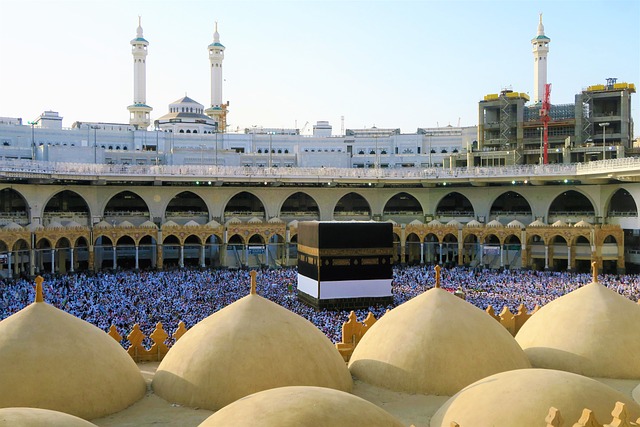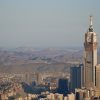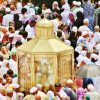- Phone No.: +44 7920015304
- Email:info@theislamicemailcircle.com
History of Prophet Ibrahim (Alaihissalaam)
The history of Ibrahim, Alayhe As-Salam, started long time ago in a distant land. Ibrahim was born amidst idol worshipping people, in the kingdom of Babylon. His father Aazar was an idol worshipper but the child could not accept this practice. As he grew older he became more skeptical about idol worshipping it is pointed out in Qur’an at Sura 43 Verse26 Sura 6 Verse74.
The history of Ibrahim, Alayhe As-Salam, started long time ago in a distant land. Ibrahim was born amidst idol worshipping people, in the kingdom of Babylon. His father Aazar was an idol worshipper but the child could not accept this practice. As he grew older he became more skeptical about idol worshipping it is pointed out in Qur’an at Sura 43 Verse26 Sura 6 Verse74.
One night Ibrahim looked up to the sky and , saw a shinning star and said:
Could this be my Lord?. But when it set he said: I do not like those that set. Like wise he went after the moon and the sun but when the sun also set he said: O my people I am free from all that you join as partners with Allah! I have turned my face towards Him Who created the heavens and the earth and never shall I give partners to Allah [6:75-80]
That is the story of the journey of Ibrahim from Polytheism (Shirk) to Islamic Monotheism (Tawheed).
Now Ibrahim set on a mission to call people to the worship of One True God, starting with his own father whom he loved much. Ibrahim argued gently with his father to give up idol worship and follow the path of Tawheed. His father rejected him followed by the people of the town, who decided to burn him which was approved by Nimrod, the king of Babylon [19:42-47; 21:68].
But Allah saved him from the blazing fire [21:69]. Ibrahim’s heart was tender and he prayed for forgiveness for his father because of a promise he made [9:114]. Ibrahim debated the king, reasoned with him to worship Allah alone (Tawheed). Even though the king had nothing to say in favor of his practice but was not ready to accept the message of Tawheed. Allah made him move from Mesopotamia (Babylon) to Syria and Palestine, with his nephew Lut, Alayhe As-Salam [21:71].
Later Ibrahim married Sarah, who had believed in Allah, and they moved to Egypt. Ibrahim, Alayhe As-Salam, then married Hajar and Allah blessed her with Ismail at a very old age. Years later Allah blessed Sarah also with a son named Ishaq.
Ibrahim took Ismail and her mother and left home and started travelling, crossing fertile land, barren mountains till they came to the Arabian desert. Ibrahim brought Hajar and her son Ismail while she was suckling him, to a place near the Ka’bah under a tree on the spot of present day Zamzam, at the highest place in the area and made them sit under a tree, placed a bag of dates and some water near her and set out homeward [Bukhari. Vol 4: H584].
Hajar ran after him and said: O Ibrahim! Where are you going, leaving us in this valley where there is no person whose company we may enjoy, nor is there anything (to enjoy)? She repeated that to him many times, but he did not look back at her.
Then she asked him: Has Allah ordered you to do so? He said yes. Then He will not neglect us she said. Ibrahim proceeded onwards, and on reaching the Thaniya where they could not see him, he faced the Ka’bah and raised both hands and made du’a to Allah: O our Lord! I have made some of my offspring to dwell in a valley without cultivation, by Your Sacred House, in order O our Lord, that they may establish regular Prayer, so fill out the hearts of some among men with love towards them, and feed them with fruits, so that they may give thanks [14:37].
Soon the water was finished and they became very thirsty. She could not look at Ismail who was crying , and found that the mountain of as-Safa was the nearest mountain to her in that area. She stood on it and started looking at he valley keenly so that she might see somebody, but she could not see anybody. She then descended from as-Safa and reached the valley, and an in the valley like a person in distress and trouble till she rossed the valley and reached al-Marwa. She kept running between as-Safa and al-Marwa. She did this seven times. This is the source of the tradition of Sa’i.
Finally when she was exhausted Allah sent an Angel. The angel said to her: Do not be afraid of being neglected , for this is the House of Allah which will be built by this boy and his father , and Allah never neglects His people. The angel started digging the earth untill water flowed. Thus the well of Zamzam was started from where millions of people have been quenching their thirst till today.
Today we are bearing the fruits of this mother’s struggle and sacrifice. Many of us drink and have drunk from the well of Zamzam. And those of us who have made Hajj run in a much more comfortable way than Hajira ever did, between Safa and Marwa.
Her commitment to her son, her sense of urgency and her unshakable faith in Allah in such harsh circumstances are all examples of not only what an excellent mother she was, but also what a strong believer in Allah she was.
Eventually, other people joined them and the valley became a living community. Time passed by Hajar died Ibrahim came back one day and had a very happy reunion with his grown-up son Ismail.
Ismail grew up and started learning Arabic from the settlers and (his virtues) caused them to love and admire him as he grew up. One day Ibrahim said: O Ismail! Allah has given me an order. Ismail said: Do what your Lord has ordered you to do Ibrahim asked: Will you help me? Ismail said: I will help you. Ibrahim said: Allah has ordered me to build a house here pointing to a hillock higher than the land surrounding it. Prophet Muhammad, sallallaho alayhe wa sallam said : Then they raised the foundation of the House (the Ka’bah). The father and the son built the Ka’bah with their own hands carrying stones themselves.
The Prophet added:
The Prophet added:
Then both of then went on building and going round the Ka’bah saying: O our Lord, accept (this service) from us. Verily, You are the All-Hearer, the All-Knower [2:127]. When completed, Ibrahim stepped on a large stone and called on the people to obey their Lord. This large stone, which he stepped on, is still there to this day near the Ka’bah. It is called Makam Ibrahim [Bukhari. Vol 4:H583].
But Allah wanted to put them to a very tough test. Ibrahim had a dream that he was sacrificing his son, which he disclosed to his son Ismail. Both of them realized that this was an order from Allah, Subhanahu wa-Taala. Ismail said with out hesitation: Do what you are commanded, you shall find me very patient insha’Allah. Allah informed Ibrahim that he has passed the test.
A sheep was sent down from the heaven to be slaughtered in place of Ismail and they had a big celebration that day [37:102-107]. This event is celebrated every year by the Muslims. It is called Eid al-Adha where animals are sacrificed.
Ibrahim and Ismail kept calling people to the worship of Allah without partners (Tawheed). Ibrahim, alone stood against his father, the society, the king using the methodology of kind persuasion, proof, logic and trust in Allah (Tawakkul) being conscience of Allah (Taqwa).
The word Hajj literaly means the Pilgrimage, but in the terminology of Islamic Shariah it means visiting Bait-Allah (the House of Allah at Makkah) to observe the necessary rituals. Hajj call for the perfection of faith since it combines in itself all the distinctive qualities of other obligatory acts.
Believers have been going to Makkah from all corners of the earth representing different colors, languages and races to celebrate the prescribed ceremonies and rituals, and to renew their call of Tawheed, following the example of all the believers, led by the noble Messengers and Prophets of Allah. They go to Makkah to answer the call that the father of the Prophets, Ibrahim, Alayhe as-Salam bore and the seal of the Prophets Muhammad, sallallaho alayhe wa sallam, called people to. After heeding this call and going round the House (Tawaf), performing the Sa’i between Safa and Marwa and staying at Arafat, they return home. They leave as sinless as those newly born. The Prophet said: A Mabroor or sound Hajj (the one accepted by Allah) has no reward other than Paradise [[Bukhari. Vol 3:H#1].
According to most scholars Hajj was made obligatory for the Muslims in the ninth year after Hijra. Allah says: :Hajj thereto is a duty people owe to Allah, those who can afford the journey, but if any deny faith, Allah stands not in need of any of His creatures [3:97].
The Prophet did only one Hajj in the tenth year after Hijra. The Prophet said: O People, Allah has made Hajj an obligation upon you therefore perform Hajj [Muslim. Vol 2:H# 3095].
From the time of decision followed by preparation for Hajj to the time of returning home an impact is made on the hearts and minds of the believers. It needs sacrifice of time, money, comfort, physical desires and pleasure all for the sake of love for Allah, and Allah has declared that He accepts the sacrifice of the people who have Taqwa (are conscience and fearful of Allah) [5:27].
The believers complete the prescribed rituals of Hajj (Manasik) which include the observation of the state of Ihram, Tawaf of the Ka’ba, Sa’i of as-Safa and al-Marwa, stay at Arafat, Muzdalifa and Mina, Rami of Jamarats, slaughtering of Hady (animals) [2:158, 196-200].
The first House of worship appointed for mankind was at Makkah, called Bakkah in the Qur’an [3:96] which was later rebuilt by Ibrahim, also the Ayah [14:37] confirm the fact that the House was already there where Ibrahim came to Makkah with his wife Hajar. The word Ka’bah means cube.
Ibrahim’s distinction is not simply his readiness to sacrifice his son but his willingness to give up his most precious belonging to the service of Allah , thus without parallel in the history of mankind. In Mina, the pilgrim practice a symbolic stoning of Shaytan that refers to the experience of the father and son of a hard test from Allah in which they defeated Shaytan who tried desperately to tempt them to disobey the Divine instructions. Thus he and his progeny were chosen by Allah to lead humanity to the true path to Allah, Subhanahu wa-Taala. His progeny became leaders doing good deeds (Khair), establishing Prayers (Salat) and giving regular charity [2:124; 21:73].
When the Call of Prophet Muhammad, sallallaho alayhe wa sallam was nearing completion, he announced his intention to perform the Hajj. The Prophet made Hajj only once in his life time but all the rituals performed by him and taught by him have remained a model for the succeeding generations and will insha’Allah remain so till the Day of Judgement.
Meeting in Arafat is a significant Sunnah of the Prophet. During Hajj, on the eighth day of Dhul Hijjah, in front of over 120,000 people at Arafat, the Prophet gave a speech which has remained the epoch making farewell speech. In this historic speech the Prophet declared in unequivocal terms:
O People! Listen to what I say. I do not know whether I will ever meet you at this place once again after the current year, It is unlawful for you to shed the blood of one another or take (unlawfully) the fortunes of one another. O People Fear Allah concerning women clothe and feed them suitably. verily, I have left amongst you the Book of Allah and the Sunnah of His Messenger which if you hold fast, you shall never go astray..O People, I am not succeeded by any Prophet.worship your Lord, pray five times, fast the month of Ramadan, offer Zakat, I recommend you to do the Hajj to the Sacred House of your Lord and to obey those who are in charge of you then you will be awarded Paradise.
[Ar-Raheeq al-Makhtum, by Safiur Rahman Mubarakpuri].
[Ar-Raheeq al-Makhtum, by Safiur Rahman Mubarakpuri].
Soon after the completion of the speech the following Ayah was revealed to him:
This day I have perfected your religion for you, completed My Favor upon you, and have chosen for you Islam as your religion [5:3].
Millions of people have been following the footsteps of the noble Prophets (peace be upon all of them) of Allah, Subhanahu wa-Taala and will continue to do so insha’Allah.
By Brother AZIZ UL HUQ
The Islamic Email Circle Copyright 2024 - All Rights Reserved





Leave Your Comments